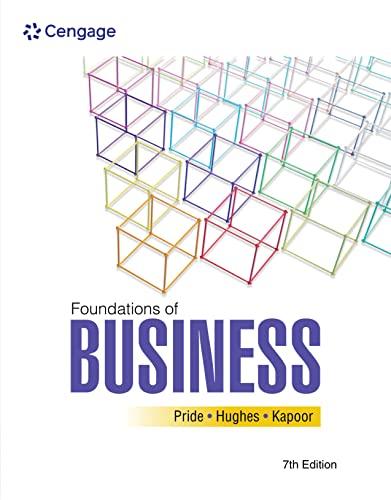SC Johnson, a multi-billion-dollar family-owned business, is a multinational manufacturer of household and professional products. Windex, Pledge,
Question:
SC Johnson, a multi-billion-dollar family-owned business, is a multinational manufacturer of household and professional products. Windex, Pledge, Drano, Scrubbing Bubbles, and Shout are just a few brands included in SC Johnson’s product portfolio. Today, Fisk Johnson is a fifth-generation family member and CEO for the privately-held company, which was founded in 1886.
It all started because of an entrepreneur named Samuel Curtis Johnson, a parquet floor salesman in Racine, Wisconsin. He traveled around Wisconsin and surrounding states selling flooring to contractors and returned home on weekends to perform managerial duties. He noted that his customers would often ask how to care for their new flooring, and, recognizing that a high-quality floor cleaning product was missing from the market, he set out to create the perfect product to meet his customers’ needs. The end result was Johnson’s Prepared Wax. Initially, he gave a can of wax to customers with their flooring orders, but demand grew beyond the customers that purchased his parquet flooring.
By 1898, sales of Johnson’s floor-care products exceeded flooring sales.
Now, SC Johnson is one of the oldest family-owned businesses in the United States. In the company’s more than 130-year history, its owners have never taken the company public unlike competitors Unilever and Procter & Gamble.
Being privately held offers many advantages. For instance, privately held companies are not required to reveal financial results to the public. According to Fisk Johnson, the financial reports that public companies must file with the government and Wall Street are a great source of information on competitors. Being privately owned also allows the company to remain true to its values rather than answer to shareholders and investors.
Another key to SC Johnson’s success is investing in research and development (R&D). The SC Johnson Research Tower, its former hub for R&D, operated from 1950 to 1982 and gave birth to brands such as Raid, Glade, Off!, and Pledge. As the company’s product line continued to grow, the company’s R&D efforts outgrew the Research Tower facility, and the department moved to a larger facility. Today, one of the key factors for the company’s R&D efforts is how each ingredient in a product will impact people and the environment.
SC Johnson’s Greenlist program, for example, assures customers the company has evaluated the ingredients that go into its products. The goal—to protect human health and the environment—looks at hazard and risk in a four-step evaluation process that reviews the following criteria: (1)
chronic human health hazards, (2) long-term environmental hazards, (3) acute risks to human and environmental health, and (4) other potential effects. If an ingredient is flagged as potentially hazardous, SC Johnson will then determine what concentration of the ingredient is appropriate for use before the final product is approved to begin the manufacturing process. In some cases, ingredients or even products are rejected. For example, the company has banned 200 unique raw materials and more than 2,400 fragrance materials.
According to CEO Johnson, remaining private allows the company to prioritize people over profit. Because SC Johnson believes employees should be treated with integrity, respect, and fairness, the company has earned a reputation for being a great place to work. The company has also received recognition for diversity and inclusion, scoring a perfect 100 percent on the 2020 Corporate Equality Index from the Human Rights Campaign. Beyond its own employees, SC Johnson is committed to strengthening communities around the world. For example, through the company’s 20 Days of Giving campaign, it donated $400,000 to organizations in communities where it operates to support economic and social mobility in underserved areas. And during the COVID-19 pandemic, SC Johnson donated $10 million to support public needs and individuals on the front lines.
SC Johnson is also finding new ways to support the environment by reducing plastic packaging to eliminate waste. In 2020, SC Johnson joined the Coalition of Action on Plastic Waste alongside Coca-Cola, Walmart, Pepsi, and others. The goal of the coalition is to develop a circular approach to plastic use in the consumer goods industry.
SC Johnson aims to make 100 percent of its plastic packaging recyclable, reusable, or compostable.
Samuel Curtis Johnson’s floor wax laid the foundation for a thriving private company and family business. Stockholders and industry analysts often exert pressure on public companies to improve financial performance, but SC Johnson has the freedom to make the best decisions for customers, employees, and the environment, even if it comes at the expense of short-term profits. In this way, SC Johnson looks to the future while honoring its past.
Discussion Questions
1. SC Johnson has a long history of developing consumer and household products. How has research and development enabled the company to develop new products that are consumer safe and environmentally friendly?
2. SC Johnson competes with Unilever, Procter & Gamble, and other large corporations that have stockholders and yet, SC Johnson has chosen to remain a private, family business. What are the advantages of management’s decision to remain private? Are there disadvantages of this type of private ownership?
3. Back in 1886, Samuel Curtis Johnson started a small business; today that business is a large, successful private corporation. How does being private impact customers, employees, and the environment?
Step by Step Answer:

Foundations Of Business
ISBN: 9780357717943
7th Edition
Authors: William M. Pride, Robert J. Hughes, Jack R. Kapoor





